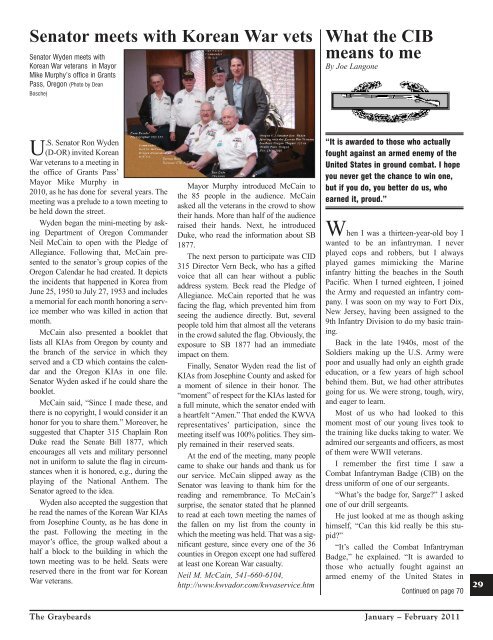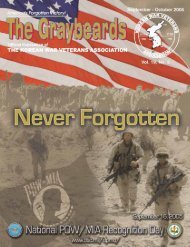gray01 Jan-Feb 2011_Gray01_Jan-Feb 2005.qxd - Korean War ...
gray01 Jan-Feb 2011_Gray01_Jan-Feb 2005.qxd - Korean War ...
gray01 Jan-Feb 2011_Gray01_Jan-Feb 2005.qxd - Korean War ...
Create successful ePaper yourself
Turn your PDF publications into a flip-book with our unique Google optimized e-Paper software.
Senator meets with <strong>Korean</strong> <strong>War</strong> vets<br />
Senator Wyden meets with<br />
<strong>Korean</strong> <strong>War</strong> veterans in Mayor<br />
Mike Murphy’s office in Grants<br />
Pass, Oregon (Photo by Dean<br />
Bosche)<br />
What the CIB<br />
means to me<br />
By Joe Langone<br />
U<br />
.S. Senator Ron Wyden<br />
(D-OR) invited <strong>Korean</strong><br />
<strong>War</strong> veterans to a meeting in<br />
the office of Grants Pass’<br />
Mayor Mike Murphy in<br />
2010, as he has done for several years. The<br />
meeting was a prelude to a town meeting to<br />
be held down the street.<br />
Wyden began the mini-meeting by asking<br />
Department of Oregon Commander<br />
Neil McCain to open with the Pledge of<br />
Allegiance. Following that, McCain presented<br />
to the senator’s group copies of the<br />
Oregon Calendar he had created. It depicts<br />
the incidents that happened in Korea from<br />
June 25, 1950 to July 27, 1953 and includes<br />
a memorial for each month honoring a service<br />
member who was killed in action that<br />
month.<br />
McCain also presented a booklet that<br />
lists all KIAs from Oregon by county and<br />
the branch of the service in which they<br />
served and a CD which contains the calendar<br />
and the Oregon KIAs in one file.<br />
Senator Wyden asked if he could share the<br />
booklet.<br />
McCain said, “Since I made these, and<br />
there is no copyright, I would consider it an<br />
honor for you to share them.” Moreover, he<br />
suggested that Chapter 315 Chaplain Ron<br />
Duke read the Senate Bill 1877, which<br />
encourages all vets and military personnel<br />
not in uniform to salute the flag in circumstances<br />
when it is honored, e.g., during the<br />
playing of the National Anthem. The<br />
Senator agreed to the idea.<br />
Wyden also accepted the suggestion that<br />
he read the names of the <strong>Korean</strong> <strong>War</strong> KIAs<br />
from Josephine County, as he has done in<br />
the past. Following the meeting in the<br />
mayor’s office, the group walked about a<br />
half a block to the building in which the<br />
town meeting was to be held. Seats were<br />
reserved there in the front war for <strong>Korean</strong><br />
<strong>War</strong> veterans.<br />
Mayor Murphy introduced McCain to<br />
the 85 people in the audience. McCain<br />
asked all the veterans in the crowd to show<br />
their hands. More than half of the audience<br />
raised their hands. Next, he introduced<br />
Duke, who read the information about SB<br />
1877.<br />
The next person to participate was CID<br />
315 Director Vern Beck, who has a gifted<br />
voice that all can hear without a public<br />
address system. Beck read the Pledge of<br />
Allegiance. McCain reported that he was<br />
facing the flag, which prevented him from<br />
seeing the audience directly. But, several<br />
people told him that almost all the veterans<br />
in the crowd saluted the flag. Obviously, the<br />
exposure to SB 1877 had an immediate<br />
impact on them.<br />
Finally, Senator Wyden read the list of<br />
KIAs from Josephine County and asked for<br />
a moment of silence in their honor. The<br />
“moment” of respect for the KIAs lasted for<br />
a full minute, which the senator ended with<br />
a heartfelt “Amen.” That ended the KWVA<br />
representatives’ participation, since the<br />
meeting itself was 100% politics. They simply<br />
remained in their reserved seats.<br />
At the end of the meeting, many people<br />
came to shake our hands and thank us for<br />
our service. McCain slipped away as the<br />
Senator was leaving to thank him for the<br />
reading and remembrance. To McCain’s<br />
surprise, the senator stated that he planned<br />
to read at each town meeting the names of<br />
the fallen on my list from the county in<br />
which the meeting was held. That was a significant<br />
gesture, since every one of the 36<br />
counties in Oregon except one had suffered<br />
at least one <strong>Korean</strong> <strong>War</strong> casualty.<br />
Neil M. McCain, 541-660-6104,<br />
http://www.kwvador.com/kwvaservice.htm<br />
“It is awarded to those who actually<br />
fought against an armed enemy of the<br />
United States in ground combat. I hope<br />
you never get the chance to win one,<br />
but if you do, you better do us, who<br />
earned it, proud.”<br />
When I was a thirteen-year-old boy I<br />
wanted to be an infantryman. I never<br />
played cops and robbers, but I always<br />
played games mimicking the Marine<br />
infantry hitting the beaches in the South<br />
Pacific. When I turned eighteen, I joined<br />
the Army and requested an infantry company.<br />
I was soon on my way to Fort Dix,<br />
New Jersey, having been assigned to the<br />
9th Infantry Division to do my basic training.<br />
Back in the late 1940s, most of the<br />
Soldiers making up the U.S. Army were<br />
poor and usually had only an eighth grade<br />
education, or a few years of high school<br />
behind them. But, we had other attributes<br />
going for us. We were strong, tough, wiry,<br />
and eager to learn.<br />
Most of us who had looked to this<br />
moment most of our young lives took to<br />
the training like ducks taking to water. We<br />
admired our sergeants and officers, as most<br />
of them were WWII veterans.<br />
I remember the first time I saw a<br />
Combat Infantryman Badge (CIB) on the<br />
dress uniform of one of our sergeants.<br />
“What’s the badge for, Sarge?” I asked<br />
one of our drill sergeants.<br />
He just looked at me as though asking<br />
himself, “Can this kid really be this stupid?”<br />
“It’s called the Combat Infantryman<br />
Badge,” he explained. “It is awarded to<br />
those who actually fought against an<br />
armed enemy of the United States in<br />
Continued on page 70<br />
29<br />
The Graybeards<br />
<strong>Jan</strong>uary – <strong>Feb</strong>ruary <strong>2011</strong>
















